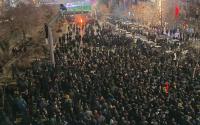16 September 2007Yahoo! NewsThomas Ferraro
U.S. Defense Secretary Robert Gates on Sunday rejected former Federal Reserve Chairman Alan Greenspan's statement that the Iraq war "is largely about oil."
With Democratic lawmakers apparently short of the votes needed to force President George W. Bush to change course, Gates defended the war, now in its fifth year, and said it's being driven by the need to stabilize the Gulf and put down hostile forces.
Gates's defense came a day after thousands of anti-war protesters marched in Washington. A spokeswoman for one of the groups who organized the march said more than 200 protesters were taken into custody, including at least 10 Iraq war veterans, when they attempted to cross a police barrier near the U.S. Capitol.
Greenspan, in his new book, "The Age of Turbulence: Adventures in a New World," echoed long-held complaints of many critics that a key motivating force in the war is to maintain U.S. access to the rich oil supplies in Iraq.
"Whatever their publicized angst over Saddam Hussein's 'weapons of mass destruction,' American and British authorities were also concerned about violence in an area that harbors a resource indispensable for the functioning of the world economy," Greenspan wrote.
"I'm saddened that it is politically inconvenient to acknowledge what everyone knows: The Iraq war is largely about oil," added Greenspan, who for decades had been one of the most respected U.S. voices on fiscal policies.
After more than 18 years at the helm, Greenspan retired in January 2006 as chairman of the Fed, the nation's central bank, which regulates monetary policy.
Appearing on ABC's "This Week," Gates said, "I have a lot of respect for Mr. Greenspan." But he disagreed with his comment about oil being a leading motivating factor in the war.
"I wasn't here for the decision-making process that initiated it, that started the war," Gates said. But he added, "I know the same allegation was made about the Gulf War in 1991, and I just don't believe it's true."
"I think that it's really about stability in the Gulf. It's about rogue regimes trying to develop weapons of mass destruction. It's about aggressive dictators," Gates said.
"After all, Saddam Hussein launched wars against several of his neighbors," Gates said. "He was trying to develop weapons of mass destruction, certainly when we went in, in 1991."
Bush last week ordered gradual troop reductions in Iraq into next summer but defied calls for a dramatic change of course, saying the U.S. military role there will stretch beyond his presidency.
Gates said he would urge Bush to veto a proposal by Democratic Sen. James Webb of Virginia that would require U.S. troops spend as much time at home as their previous tour in Iraq.
"It would be extremely difficult for us to manage that," Gates said. "It really is a backdoor way to try and force the president to accelerate the drawdowns. Again, the drawdowns have to be based on the conditions on the ground."
Senate Armed Services Committee Chairman Carl Levin, a Michigan Democrat, said he did not know if the Senate, held by Democrats, 51-49, would be able to muster the 60 votes needed to clear a Republican procedural roadblock and approve the Webb measure. But he said "it has a good chance."
He conceded, however, that at this point backers do not have the two-thirds majority that would be needed to override a Bush veto of the legislation.
"But that doesn't mean we shouldn't fight for what we believe in just because the president may veto it," Levin said on CBS's "Face the Nation."
"I think there's enough Republicans who believe we've got to change course but whether they'll vote that way, we just simply don't know," Levin said.
(Additional reporting by David Wiessler, Mark Felsenthal and Doug Palmer)






